The SSD Anthology: Understanding SSDs and New Drives from OCZ
by Anand Lal Shimpi on March 18, 2009 12:00 AM EST- Posted in
- Storage
PCMark Vantage
Next up is PCMark Vantage, another system-wide performance suite. For those of you who aren’t familiar with PCMark Vantage, it ends up being the most real-world-like hard drive test I can come up with. It runs things like application launches, file searches, web browsing, contacts searching, video playback, photo editing and other completely mundane but real-world tasks. I’ve described the benchmark in great detail before but if you’d like to read up on what it does in particular, take a look at Futuremark’s whitepaper on the benchmark; it’s not perfect, but it’s good enough to be a member of a comprehensive storage benchmark suite. Any performance impacts here would most likely be reflected in the real world.
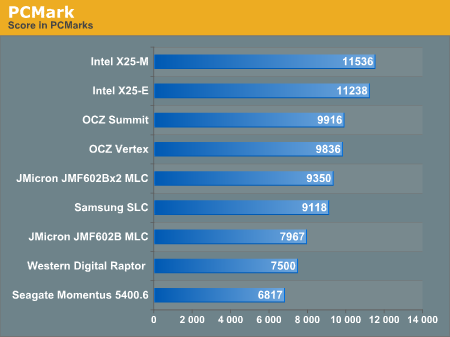
If you've paid attention to the synthetic tests from the previous pages, the results here should make sense. The Intel drives take the top two spots followed by the two OCZ drives, then the JMicron and conventional HDDs take up the rear.
While PCMark does do a great job of measuring disk performance, it doesn't seem to stress random write performance as much, allowing the JMicron drives to relax a bit.
Now let's look at the individual test suites:
The memories suite includes a test involving importing pictures into Windows Photo Gallery and editing them, a fairly benign task that easily falls into the category of being very influenced by disk performance.
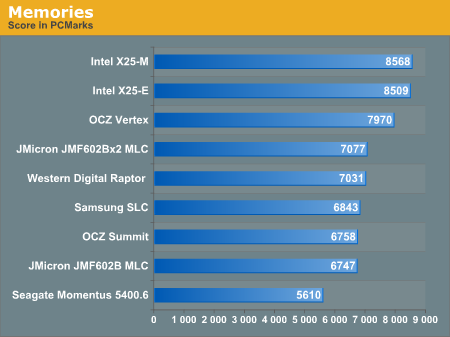
The TV and Movies tests focus on on video transcoding which is mostly CPU bound, but one of the tests involves Windows Media Center which tends to be disk bound.
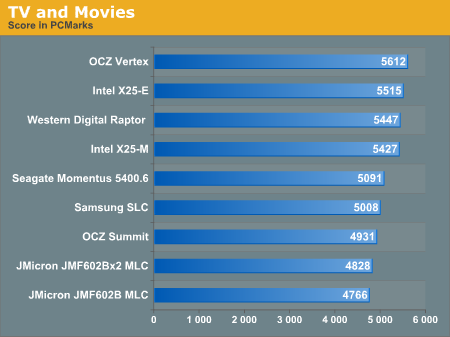
SSDs won't always dominate and in many cases they won't offer tangible improvements over a fast hard drive.
The gaming tests are very well suited to SSDs since they spend a good portion of their time focusing on reading textures and loading level data. All of the SSDs dominate here, but as you'll see later on in my gaming tests the benefits of an SSD really vary depending on the game. Take these results as a best case scenario of what can happen, not the norm.
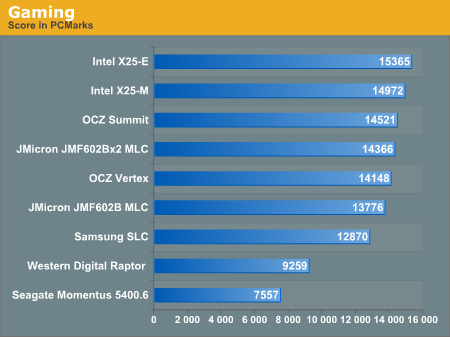
In the Music suite the main test is a multitasking scenario: the test simulates surfing the web in IE7, transcoding an audio file and adding music to Windows Media Player (the most disk intensive portion of the test).
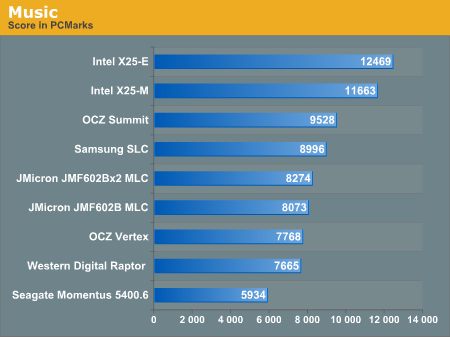
The Communications suite is made up of two tests, both involving light multitasking. The first test simulates data encryption/decryption while running message rules in Windows Mail. The second test simulates web surfing (including opening/closing tabs) in IE7, data decryption and running Windows Defender.

I love PCMark's Productivity test; in this test there are four tasks going on at once, searching through Windows contacts, searching through Windows Mail, browsing multiple webpages in IE7 and loading applications. This is as real world of a scenario as you get and it happens to be representative of one of the most frustrating HDD usage models - trying to do multiple things at once. There's nothing more annoying than trying to launch a simple application while you're doing other things in the background and have the load take seemingly forever.
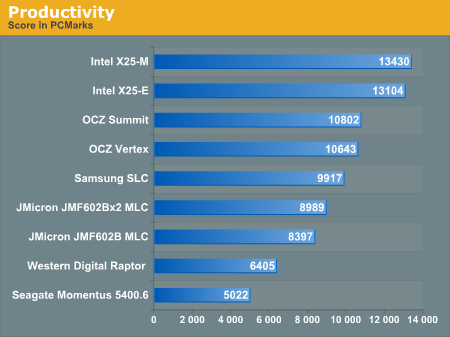
The results here are the best characterization of my personal experience with the drives. The Intel drives are the fastest, a good 25% faster than the Summit or Vertex. Next up are the OCZ drives, with the Vertex dangerously close to the Summit. The older Samsung SLC is next in the standings, followed by the JMicron drives. There's a healthy combination of reads and writes going on here which benefits all of the SSDs, including the less desirable ones.
The final PCMark Vantage suite is HDD specific and this is where you'll see the biggest differences between the drives:
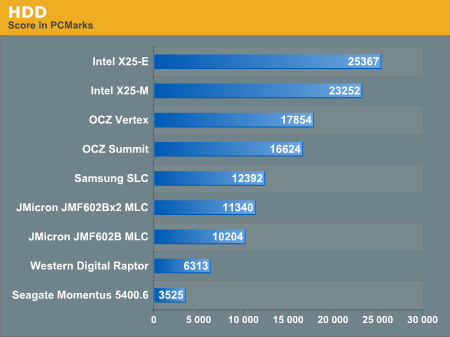
Again we're seeing the sort of breakdown we'd expect. The Intel drives come out ahead, while the Vertex is the best bang for your buck.










250 Comments
View All Comments
strikeback03 - Thursday, March 19, 2009 - link
I understand your point, but I am not sure you understand the point I (and others) are trying to make. The SSD makers (should) know their market. As they seem to be marketing these SSDs to consumers, they should know that means the vast majority are on Vista or OSX, so the OS won't be optimized for SSDs. It also means the majority will be using integrated disk controllers. Therefore, in choosing a SSD controller which does not operate properly given those restrictions, they chose poorly. The testing here at Anandtech shows that regardless of how the drives might perform in ideal circumstances, they have noticeable issues when used the way most users would use them, which is really all those users care about.tshen83 - Thursday, March 19, 2009 - link
In the history of computing, it was always the case that software compensated for the new hardware, not the other way around. When new hardware comes out that obsoletes current generation of software, new software will be written to take advantage of the new hardware.Think of it this way: you always write newer version of drivers to drive the newest GPUs. When is the last time newer GPUs work with older drivers?
Nobody should be designing hardware now that makes DOS run fast right? All file systems (except ZFS and soon BTRFS) are obsolete now for SSDs, so we write new file systems. I am not sure Intel X25-M's approach of virtualizing flash to the likings of NTFS and EXT3 is the correct one. It is simply a bridge to get to the next solution.
SSD makers right now are making a serious mistake pushing SSDs down consumer's throats during an economic crisis. They should have focused on the enterprise market, targeting DB servers. But in that space, Intel X25-E sits alone without competition. (Supertalent UltraDrive LEs should be within 25% of X25-E by my estimation)
pmonti80 - Thursday, March 19, 2009 - link
Now I understand what you meant in the beginning. But still I don't agree with you, the system reviewed is the one 99% of SSD buyers will use(integrated mobo controller + NTFS). So, why optimize the benchmark to show the bad drives in a good light?About the Vertex, I don't understand what you are complaining about. After reading this article most people got the idea that Vertex is a good drive and at half Intel's price (I know, I searched on google for comments about this article).
tshen83 - Thursday, March 19, 2009 - link
Professional people only look at two SSD benchmarks: random read IOPS at 4k and random write IOPS at 4k(Maybe 8K too for native DB pages).The Vertex random write IOPS at 4K size is abysmal. 2.4MB/sec at 4K means it only does 600ish random write IOPs. Something was wrong, and Vista/ICH10R didn't help. The 8GB/sec write boundary Anand imposed on the random write IOPS test is fishy. So is the artificial io queue depth = 3.
The vertex random write IOPS should be better. The random read IOPS also should be slightly better. I have seen OCZ's own benchmark placing the Vertex very close to Intel X25-M at random read/ write IOPS tests.
I personally think that if you use NTFS, just ignore the SSDs for now until Windows 7 RTM. You can't hurt waiting for SSD price to drop some more in the next 6 months. Same thing for Linux, although I would argue that Linux is even in a worse position for SSDs right now than windows 7. EXT3/EXT4/JFS/XFS/REISERFS all suck on SSDs.
gss4w - Thursday, March 19, 2009 - link
Anandtech should adopt the same comment system as Dailytech so that comments that don't make any sense can be rated down. Who would want to read a review of something using a beta OS, or worse an OS that is only used on servers? I think it would be interesting to see if Windows 7 beta offered any improvements, but that should not be the focus of the review.7Enigma - Thursday, March 19, 2009 - link
Here's another vote for the Dailytech comments section. The ability to rate up down, but more importantly HIDE the comments below a threshold would make for much more enjoyable reading.curtisfong - Wednesday, March 18, 2009 - link
Why should Anand test with Windows 7b or *nix? What is the majority OS?Kudos to Anand for testing real world performance on an OS that most use, and to Intel for tuning their drives for it. I'm happy the other manufacturers are losing business..maybe they will also tune their drives for real world performance and not synthetic benchmarks.
To the poster above: do you work for OCZ or Samsung?
Glenn - Wednesday, March 18, 2009 - link
tshen83 "A very thorough review by tshen83, an hour agoBUT, still based on Windows Vista.
"
As long as these drives are marketed toward said OS, why would you not use it? Most of us wouldn't recognize Solaris if we saw it! And I believe you seriously overestimate yourself if your gonna drill anything into Anands head! You might need your own site, huh?
Great Job Anand! Don't forget to remind these CEO's that they also need to provide any software needed to configure and optimize these drives to work properly. ie go to OCZ Forums and try to figure out how to align, optimize and keep your drive running like it's supposed to, in less than 4 hours of reading! It would be nice if these companies would do their own beta testing and not rely on early adopters to do it for them!
Roland00 - Wednesday, March 18, 2009 - link
It was a joy to read all 31 pagesMagicPants - Wednesday, March 18, 2009 - link
Anand it would be really helpful to have a list of SSD companies blacklisting you so I know which ones to avoid. In general it would be nice to know who doesn't provide review samples to reputable sites.